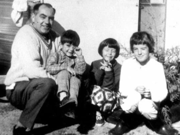What REALLY happens after life? This man didn't see God during a near-death experience
By
Gian T
- Replies 0
The question of what lies beyond the veil of death has puzzled humanity for eons. Tales of bright lights, long-departed relatives, and divine figures are common in the accounts of those who've skirted the edges of the afterlife. But not every near-death experience fits the mould of these ethereal encounters. Sometimes, the reality is far more unexpected, as one man's harrowing tale reveals.
James, whose routine operation took a perilous turn, shared his experience, which was devoid of the spiritual encounters many anticipate. Instead of a celestial meeting or a life review, James was met with an expanse of white and a sense of detachment from the urgency unfolding around him.
'James, you need to breathe.' These words, spoken by a nurse, pierced through the fog of anaesthetic and fentanyl, but James found himself unable to comply. His body was unresponsive, his mind adrift in a sea of white. The familiar comfort of his parents' thoughts was his last cognitive anchor before succumbing to the void.
The operation—a common procedure to remove his gallbladder—had been approached with the casual confidence of routine. Yet, in the operating room, James's expectations of a swift recovery were upended. Instead of a countdown, he was plunged into darkness, awakening later to a world altered by medication and the physical evidence of surgery.
As he lay in the recovery ward, the effects of the anaesthetic and fentanyl wove a tapestry of confusion and disorientation. The pain was absent, thanks to the potent opioid, which, under medical supervision, is a powerful tool for relief. However, the same substance, when misused or illicitly manufactured, can be deadly—a fact James was all too aware of from his knowledge of the opioid crisis.
The stark contrast between his controlled medical experience and the tragic outcomes of street fentanyl use was not lost on him. In the safety of the hospital, mechanisms were in place to reverse the respiratory depression that had gripped him. Outside these walls, the same drug claimed lives with reckless abandon.
James's journey back from the brink was marked by the professionalism and swift action of the medical staff. Their expertise was a counterpoint to his vulnerability, a reminder of the fragility of life and the thin line between here and the hereafter.
In the weeks following his ordeal, James reflected on the absence of control, the surreal nature of his experience, and the gratitude he felt towards those who had steered him through the crisis. The physical scars were healing, and the gallbladder pain was a memory, but the psychological imprint of his near-death experience lingered.
For our readers over 60, James's story is a poignant reminder that life can take unexpected turns, even in the most controlled environments. It also underscores the importance of having trust in the medical professionals who guide us through our most vulnerable moments.
 We invite you to share your thoughts and experiences. Have you or someone you know had a near-death experience? Did it align with the common narratives, or was it something entirely different? Join the conversation and let us know in the comments below.
We invite you to share your thoughts and experiences. Have you or someone you know had a near-death experience? Did it align with the common narratives, or was it something entirely different? Join the conversation and let us know in the comments below.
James, whose routine operation took a perilous turn, shared his experience, which was devoid of the spiritual encounters many anticipate. Instead of a celestial meeting or a life review, James was met with an expanse of white and a sense of detachment from the urgency unfolding around him.
'James, you need to breathe.' These words, spoken by a nurse, pierced through the fog of anaesthetic and fentanyl, but James found himself unable to comply. His body was unresponsive, his mind adrift in a sea of white. The familiar comfort of his parents' thoughts was his last cognitive anchor before succumbing to the void.
The operation—a common procedure to remove his gallbladder—had been approached with the casual confidence of routine. Yet, in the operating room, James's expectations of a swift recovery were upended. Instead of a countdown, he was plunged into darkness, awakening later to a world altered by medication and the physical evidence of surgery.
As he lay in the recovery ward, the effects of the anaesthetic and fentanyl wove a tapestry of confusion and disorientation. The pain was absent, thanks to the potent opioid, which, under medical supervision, is a powerful tool for relief. However, the same substance, when misused or illicitly manufactured, can be deadly—a fact James was all too aware of from his knowledge of the opioid crisis.
The stark contrast between his controlled medical experience and the tragic outcomes of street fentanyl use was not lost on him. In the safety of the hospital, mechanisms were in place to reverse the respiratory depression that had gripped him. Outside these walls, the same drug claimed lives with reckless abandon.
James's journey back from the brink was marked by the professionalism and swift action of the medical staff. Their expertise was a counterpoint to his vulnerability, a reminder of the fragility of life and the thin line between here and the hereafter.
In the weeks following his ordeal, James reflected on the absence of control, the surreal nature of his experience, and the gratitude he felt towards those who had steered him through the crisis. The physical scars were healing, and the gallbladder pain was a memory, but the psychological imprint of his near-death experience lingered.
For our readers over 60, James's story is a poignant reminder that life can take unexpected turns, even in the most controlled environments. It also underscores the importance of having trust in the medical professionals who guide us through our most vulnerable moments.
Key Takeaways
- James Reynolds experienced a near-death event during a routine operation to have his gallbladder removed, where he stopped breathing and required quick intervention from hospital staff.
- He describes a sensation of whiteness and an absence of expected phenomena, such as his life flashing before his eyes or seeing God, challenging common expectations of near-death experiences.
- He details the effects of fentanyl, an opioid given during his recovery, which made him lose the ability to breathe on his own, leading to respiratory depression and a need for a respirator.
- Reflecting on his experience, James acknowledges the professionalism and effectiveness of the medical team in handling the crisis and expresses gratitude for their support while grappling with the lingering impression of having lost control during the incident.








